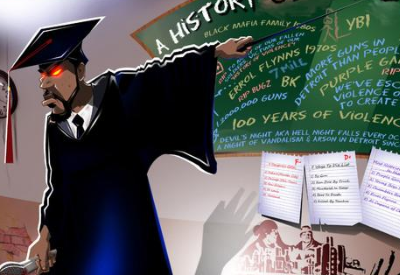by Apu

On December 16, 2014, Kuniva released his official debut studio project, A History of Violence. It followed a long stream of mixtapes (Retribution, the Midwest Marauders series, and the Lost Gold mixtape). Unlike the music that was on the mixtapes, Kuniva used all original production (primarily handled by Block Symfany, a production team composed of Rio Da Ghost and T.Boyd out of Michigan), and made actual fleshed-out songs, rather than just long verses and freestyles. Overall, it’s a very solid solo offering. It set the stage for him to grow and dig deeper in his later material.
The best part of this project to me is how Kuniva put it together. It sort of sounds like he sequenced the album very deliberately. The first 4 tracks seem like they’re from the perspective of a younger, more rowdy Kuniva. Those tracks tend to celebrate the street life. It opens up with the posse cut “Michiganish”, featuring Aftermath artist Jon Connor, Mass Appeal’s Boldy James, and Detroit legend Guilty Simpson. It starts things off fairly simply, being a competitive cypher of sorts. The following few songs, “Born Like This”, “Where I’m From”, and “Baileys In Bangkok,” all have a similar sort of vibe. They’re cocky and rowdy. They sound a little ironic and tongue in cheek, almost as though Kuniva was trying to rap the way a younger kid would rap. The content and the way it’s done makes me think he was talking about the street life, from the perspective of a kid living it, rather than someone reflecting on it.
Then comes “Derty Headz”, which is a very powerful song dedicated to fans of his and D-12. It has an anthemic hook and verses that drop all sorts of history about his career. He talks about Proof recruiting him for the group, the beef they’ve had, and the adversity they’ve faced from within since Proof passed. This song is the major turning point in almost every way. Here, flashes of reflection and maturity start to show up. From track 6 onwards, it seems to shift to his perspective now as a man nearly 40 years old after having seen massive success with his group, mournfully reflecting on the hard times in life but looking ahead with a drive to keep moving now that he’s out. “Light Work” and “Where The Hoes @?”, both offer fiery production and strong verses delivered with the hunger and confidence of a man who has seen his fair share of hardship. The title track, which is quite possibly the most personal and poetic song Kuniva has ever released, has him speaking on his past up to the point when Proof was murdered in chilling, almost uncomfortably rich detail, his voice oozing pain over him reflecting on it, and the album ends on “Shoutout”, which sounds like where he’s at now, looking forward into the future with hope after everything he’s been through.
The music on this project is good. There’s no denying that Kuniva is a strong rapper and has been doing nothing but improving since D-12 World. His delivery has become a lot more convincing and his writing has gotten sharper. The production is great too. Block Symfany (and Enrichment, on the title track) were able to provide Kuniva with a backdrop that deviated from the typical D-12 sound. It gave Kuniva the chance to step out of that style and develop his own identity, which is something that he hasn’t had the chance to really do much in the past outside of his Retribution mixtape. I think the first half of the album is a little shaky and unfocused at points, but every song from “Derty Headz” onwards is great. The title track might be one of my favorites of the entire year of 2014, period.
However, what really makes the album good is how it lives up to its name of being a “history”. Kuniva put the album together to actually make it almost like a song-by-song history of his life, from rapping competitively at the Hip-Hop Shop and living in the streets, to when D-12 were at their peak, and ending it with an adult perspective on life. It’s really special, because oftentimes artists don’t do that kind of thing when putting their projects together. You generally hear about Kendrick and the like putting their albums together in a manner like that, but honestly, Kuniva managed to pull off an album concept as well as anybody else. Even if it wasn’t fully intentional, he still clearly had an idea of progressing the sound and content of the project in a way that made sense, as opposed to putting the songs together in an arbitrary order and releasing it onto iTunes. That, to me, is what really makes it good, and not just another hip hop album.
One thought on “Retrospective Review: A History of Violence, by Kuniva”